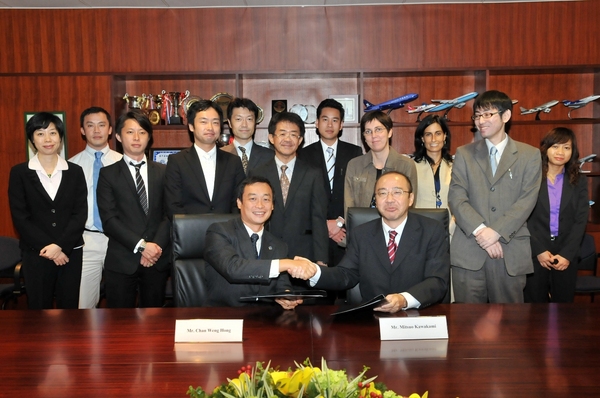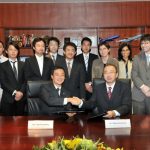
Ever since the scheduled air services between Macao and Japan have been launched in 2007, the flights have attracted residents of both places as well as those in the Pearl River Delta Region to respond favourably to the market. The passenger volume increases year on year. In order to further liberalize the air transport market between Macao and Japan so that the development of air passengers and cargo between the two places will be enhanced, the Civil Aviation Authority of Macao SAR (AACM) and the Civil Aviation Bureau (CAB), Ministry of Land, Infrastructure, Transport and Tourism of Japan met in Macao on 13 and 14 July 2011 to renew the Record of Discussions (ROD) relating to air services between the two places. According to the new ROD which was signed by both parties, Japan agreed to increase the Tokyo capacity to the Macao designated airline with 7 flights per week from 2012 and then eliminate all Tokyo capacity restrictions from 2013 when the capacity at Narita Airport has increased. In addition, Japan agreed to grant fifth freedom traffic rights to the Macao designated airline for all points in Japan, except Tokyo. The new ROD has created more advantageous conditions for the operation of air services by the Macao designated airline. In accordance with the old ROD which was signed in 2009, Macao can fly to all points in Japan with no capacity restrictions. However, the operation to Tokyo Narita Airport was only limited to 3 flights per week; besides, fifth freedom rights were not granted to Macao. The new ROD has removed these restrictions. From 2012 summer season, the Macao designated airline can fly 7 flights per week to Tokyo; from 2013 summer schedule when the capacity at Narita Airport has increased, the Macao designated airline is allowed to operate flights to Tokyo with unlimited frequencies. In the aspect of traffic rights, the Macao designated airline can enjoy fifth freedom rights for all points in Japan except Tokyo. In the aspect of code-sharing for domestic segments, the old ROD only allowed up to 5 segments with 2 frequencies per segment. The new ROD has lifted these restrictions. During the discussions, the Macao side stated that the number of Japanese tourists to Macao increases year on year and ranks the fifth position in Macao's inbound travel. Affected by the earthquake in March this year and the radiation impact that followed afterwards, the number of Japanese tourists to Macao has decreased by 10%; Air Macau Co. Ltd. was forced to either suspend or reduce the frequencies for their flights to Tokyo and Osaka. But as the aftermath has slowly steadied and the tourism activities in Japan are gradually turning back to normal, Air Macau Co. Ltd. has gradually resumed their normal flights to the two cities since July. In addition, the Macao side also took the opportunity to explain to the Japanese side the open skies policies in the territory and the vision of Macao's participation in Pearl River Delta (PRD) cooperation. Guangdong, HongKong and Macao will intensify their cooperation to cope with the need for regional integration; the construction of the new road transport network between the cities in PRD, and the Hong Kong-Zhuhai-Macao Bridge will enhance the accessibility of Macau International Airport by the cities in the Region. As Macao itself does not generate enough passengers to support its air transport, it is therefore the aim of Macao International Airport to extend its catchment area from its own population to the PRD area. In the meeting, the Japanese side stated that Japan is now facing economic downturn. The earthquake in March has brought a big impact on their international air services. Japan therefore hopes to recover its economy soon. In the aspect of aviation, Japan will further liberalize their skies, for example, granting fifth freedom traffic rights, and strive to fully utilize the potentials of their airports and airlines, for example, privatizing the airports in order that the resources will be better allocated to increase operational benefits. Furthermore, the Macao side expressed their wish to operate to the Haneda Airport. However, the Japanese side stated that the capacity at the Haneda Airport is fully saturated and therefore does not have slots to offer to new airlines. However, the Haneda Airport is planning to increase the daytime slots. Japan has always been the market that the SAR Government is eager to exploit and consolidate. With the support of the SAR Government, the airline in Macao has played an active role in developing the market between the two places. The passenger throughput has increased from 21,569 in 2007 to 93,406 in 2010, the number of which has grown more than three times. These statistics prove that Macao is proactive in developing the Japanese market and good results are achieved. The favourable response by the passengers also proves that there is a big potential in developing the air transport market between Macao and Japan. The AACM President, Mr. Simon Chan said, "In our previous talks with the Japanese aeronautical authorities, we have always requested Japan to grant us Tokyo in the route operated by the Macao designated airline. However, due to the saturation in the capacity at the Narita Airport, Japan could only give us Tokyo with operational limitations. But with these years of thriving traffic performance achieved by our airline and the increased capacity at the Narita Airport in the future, Japan has now agreed to liberalize the conditions of our operations to Tokyo." Mr. Simon Chan also pointed out that among the Japanese tourists, only less than 10% choose to arrive in Macao by air, there is a big potential to increase our air traffic by attracting these tourists to take the air mode to Macao. He therefore hoped that the airline in Macao will operate the flights between Macao and Japan with endeavours and therefore make the most use of the aviation resources, such that the trade and commerce, tourism and cultural exchange between the two places can further be enhanced. The Chief Air Talks Officer, CAB, MLIT of Japan, Mr. Mitsuo Kawakami, and Mr. Simon Chan represented the two authorities to sign the new ROD. Apart from the officials from the two aeronautical authorities, the delegations also comprised representatives from Air Macau Co. Ltd., CAM-Macau International Airport Co. Ltd., the Consulate General of Japan in Hong Kong, Japan Airlines Co. Ltd. and All Nippon Airways Co. Ltd.


